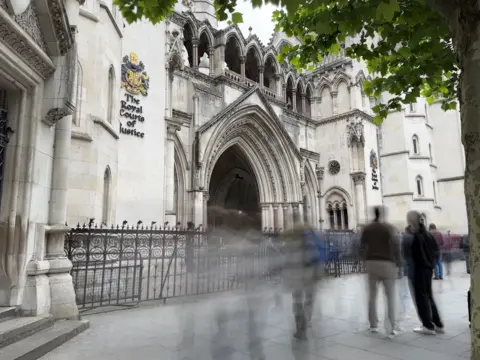Killer dad's sentence was 'humane' - appeal judges
 Family handout
Family handoutThe prison sentence of a man who was convicted of murdering his 14-year-old daughter in what he claimed was a play fight was "justified and humane", judges have said.
Simon Vickers, 50, fatally stabbed his daughter Scarlett in the chest with a kitchen knife at their home in Darlington in July 2024.
He had alleged it was a "freak accident" while the pair were "mucking about", but jurors at Teesside Crown Court found him guilty of murder and he was jailed for life with a minimum term of 15 years.
Court of Appeal judges have now ruled the sentence was not unduly lenient following a review.
Lord Justice Stuart-Smith said the trial judge's sentence was "properly to be described as merciful, but it is none the worse for that".
Vickers' trial heard Scarlett suffered a 4in (11cm) deep wound to her heart when she was stabbed in the kitchen of her family home on Geneva Road on the evening of 5 July.
Both her father and mother claimed the injury was inflicted accidentally but a pathologist said it was "practically impossible" for it to have been caused by anything other than a knife being held firmly in a hand.
 Durham Police
Durham PoliceThe case was referred under the unduly lenient sentence (ULS) scheme by an unknown person to the Solicitor General, who passed it on to the Court of Appeal to consider.
In a written submission on behalf of the Solicitor General at the Royal Courts of Justice in London, Louise Oakley said the case had been an "extremely difficult task" for the sentencing judge Mr Justice Cotter.
Ms Oakley said it was a case where a child died as a result of an "unprecedented burst of anger by an otherwise caring parent".
But the "highly experienced" judge gave too much weight to mitigating factors and not enough to aggravating features, she said, which "failed to adequately reflect the overall seriousness" of the crime.
 Google
GoogleIn particular, Ms Oakley said the judge had not adequately counted the use of a knife in the killing as an aggravating factor which, if it had been, would have seen an increase on the 15-year minimum.
Scarlett's age and the fact she was killed in a "domestic context", which represented a "violation of the trust" children should have in their parents, should also have elevated the sentence, Ms Oakley said.
She also said the judge "erred" in "completely disregarding" Vickers' previous convictions, in particular for intentionally wounding a man, whose face he slashed with a Stanley knife in October 1993, for which the then 19-year-old received two years' detention in a Young Offender Institution.
Ms Oakley also said the judge gave too much credit for the lack of premeditation and "absence of an intention to kill" by Vickers, adding: "[Vickers] deliberately picked up and used a knife for no reason whatsoever.
"Scarlett posed no threat to the offender."
She also said Vickers had not accepted responsibility for what he did.

In response, Nicholas Lumley KC, who represented Vickers at trial, said Mr Justice Cotter had presided over a "very highly charged trial" and was "uniquely placed" to judge the culpability, remorse and punishment already inflicted on Vickers.
He said the judge had "weighed all matters appropriately" and his conclusion had been "reasonable".
The appeal court judges Lord Justice Stuart-Smith, Mr Justice Goose and Mrs Justice Eady said everyone accepted it was an "exceptional and unique" case.
Lord Justice Stuart-Smith said Scarlett and her parents had been a "happy family who doted on each other" whose lives "changed catastrophically" on 5 July.
He said Scarlett's mother Sarah Hall and their wider family still "resolutely supported" Vickers.
But, he added, the appeal court could not let the family's vehement defences of Vickers affect them and the findings of the jury had to be respected.
Lord Justice Stuart-Smith said the trial judge had reached a "justified and humane conclusion" in a "very difficult" case, adding: "It is properly to be described as merciful, but it is none the worse for that."
Ms Hall previously told the BBC she still believed her daughter's death was a tragic accident.
